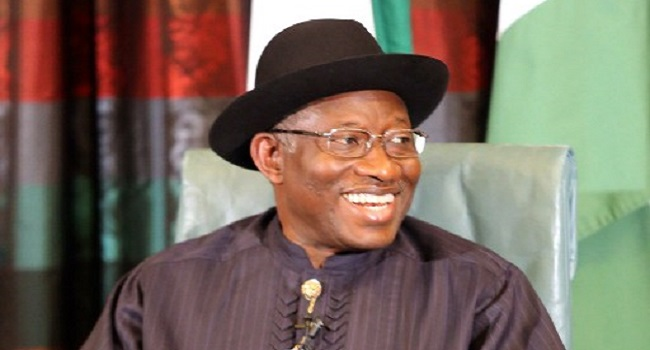
Reported by: Richard O. | Edited by Gabriel Osa
Abuja – Former President Goodluck Jonathan has formally indicated his intention to contest the 2027 Nigerian presidential elections, a move that has reignited debates about Nigeria’s political and economic history. While some citizens welcome his participation as a continuation of democratic choice, others express skepticism, citing his previous record in office and the economic challenges the country faced during his tenure.
Jonathan, who served as Nigeria’s President from 2010 to 2015, has been publicly endorsed by Professor Jerry Gana, the former Minister of Information and National Orientation. Gana asserted that Jonathan is capable of reclaiming power under the banner of the People’s Democratic Party (PDP), claiming that the former president could lead Nigeria to renewed prosperity. However, the administration of President Bola Tinubu has issued a detailed statement highlighting what it describes as Jonathan’s poor economic performance during his presidency.
According to the statement from the Special Adviser on Information and Strategy, Bayo Onanuga, Jonathan’s administration failed to utilize Nigeria’s significant oil revenues effectively, despite benefiting from historically high crude oil prices averaging $100 per barrel between 2010 and 2013. At the start of his presidency, foreign reserves were reported at $46 billion, with an additional $20 billion in the Excess Crude Account. By 2015, these reserves had fallen below $30 billion, and the Excess Crude Account had dwindled to just $2 billion, despite record oil revenues.
The Tinubu administration’s statement further criticized the mismanagement of security funds, distributed to cronies and associates during Jonathan’s tenure, and pointed out that states and federal civil servants faced severe salary arrears. At least 28 states reportedly owed their workers, creating widespread financial strain and economic stagnation. The administration framed these issues as part of the legacy Jonathan left behind—a legacy that President Tinubu has spent the past 28 months addressing through bold economic reforms.
President Tinubu’s measures, according to official statistics, include the removal of the fuel subsidy, consolidation of exchange rates, and elimination of arbitrage opportunities in foreign exchange, steps that have stabilized the economy and restored investor confidence. GDP growth reached 4.23% in Q2 2025, outpacing the IMF projection of 3.4%, while inflation fell to 20.12% in August 2025. Foreign reserves currently stand at $42.03 billion, and the Naira has stabilized, signaling a recovery from the economic mismanagement highlighted by the Tinubu administration. Road infrastructure projects, including major highways, are underway, while ongoing security reforms aim to mitigate threats in affected regions.
The announcement of Jonathan’s candidacy has drawn mixed reactions from the public. Social media platforms, including X (formerly Twitter), have seen vigorous debates about whether his previous governance failures outweigh his experience and political acumen. Many citizens questioned whether returning to office is in the country’s best interest, given past economic challenges. A Lagos-based civil society activist, Chidi Okeke, commented, “While Jonathan has the right to contest, Nigerians must critically evaluate the impact of his previous policies. Leadership experience matters, but accountability and foresight are crucial.”
Conversely, PDP supporters argue that Jonathan’s experience provides institutional knowledge that could benefit governance and policy continuity. They highlight his diplomatic relationships and familiarity with both domestic and international economic structures as potential advantages in leading the country. Many argue that, with lessons learned, Jonathan could make informed decisions to advance national development.
Political analysts have also weighed in on the implications of Jonathan’s candidacy. Dr. Funke Adeyemi, a lecturer in political science at the University of Abuja, noted, “The entry of former leaders into new elections is part of democratic practice. However, voters should carefully examine past performance alongside current policies. Jonathan’s tenure will inevitably influence voter perception, especially in light of the economic improvements achieved under the Tinubu administration.”
Legal experts have emphasized that Jonathan’s eligibility will be scrutinized both constitutionally and electorally. The Special Adviser on Information and Strategy reminded the public that while Jonathan has the right to run, his candidacy is subject to judicial review, and the electorate will ultimately decide whether he can offer meaningful change after his previous term.
Economists have also weighed in on the potential consequences of a Jonathan return to office. Professor Chukwuemeka Nwosu, an economic analyst at Lagos Business School, said, “The key question for voters is whether his policies will strengthen or destabilize the economy. The Tinubu administration has stabilized core macroeconomic indicators, and any disruption could affect investor confidence and growth momentum.”
Public sentiment reflects these concerns. A survey conducted by a national polling firm indicated that while 34% of respondents viewed Jonathan’s experience positively, 52% expressed apprehension about returning to leadership, citing previous mismanagement of public funds and economic inefficiencies. Youth groups have also expressed skepticism, emphasizing the need for leaders who prioritize economic innovation, job creation, and infrastructure development.
Political observers suggest that Jonathan’s candidacy will shape the PDP’s strategy, potentially reigniting debates over party unity and leadership direction. Analysts note that the PDP will need to navigate internal dynamics carefully to avoid repeating past mistakes that contributed to electoral losses in 2015.
As the 2027 race officially opens, Jonathan enters a field of candidates at a time when economic recovery, security, and national infrastructure remain top priorities for voters. Experts agree that the coming months will involve rigorous political campaigns, public debates, and increased scrutiny of candidates’ records, with voters assessing who can best lead Nigeria toward sustainable development.
While Jonathan’s candidacy is welcomed as a democratic right, analysts stress that the electorate is likely to weigh his past record against the economic gains achieved under current leadership. For many Nigerians, the question remains whether his experience can translate into renewed prosperity or if lessons from history will inform their voting decisions.
📩 Stone Reporters News
🌍 stonereportersnews.com | ✉️ info@stonereportersnews.com
📘 Facebook: Stone Reporters | 🐦 X (Twitter): @StoneReportNews


Add comment
Comments